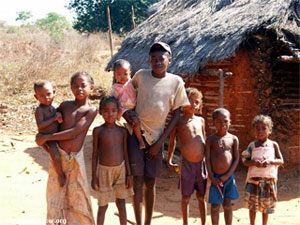Number of hungry Africans doubles in a decade
Rhett A. Butler, mongabay.com
January 24, 2006
EDITOR’S SUMMARY: The number of Africans requiring food assistance has doubled in the past decade due to crop failures, drought, failing governments, civil strife, and the impact of AIDS, said the United Nations World Food Programme. The World Food Programme says it will to provide food assistance this year to some 43 million people across Africa, including some 35 million in need of emergency food aid, for a total of over $1.8 billion.
A release from the World Food Programme appears below.
Number of Africans being fed by UN World Food Programme doubles in a decade
United Nations World Food Programme release
With the number of Africans in crisis being fed by the United Nations World Food Programme (WFP) having doubled in a decade, the agency today called on the continent’s leaders, meeting in Sudan for their annual summit, and donor countries to adopt a “food first” policy this year.
WFP said it aims to provide food assistance this year to some 43 million people across Africa, including some 35 million in need of emergency food aid, for a total of over $1.8 billion.
 A long-term approach to helping the poor in Africa through private enterprise This past Saturday millions of people watched the anti-poverty “Live 8” concerts held in London, Tokyo, Johannesburg, Paris, Rome, Berlin, Moscow, Philadelphia and Barrie, Canada. Live 8 coincides with tomorrow’s G8 summit of world leaders and aims to raise awareness of the need for aid, debt relief and fairer trade for Africa. While the cancellation of debt and delivery of aid to Africa is a noble and needed cause for a desparately poor continent, policy makers will need to ensure that funds are spent wisely to maximize the benefits for the largest number of Africans. In the past, aid to the developing world has met mixed reviews. Some of the largest recipients of aid are still some of the world’s poorest countries. What’s going on here? Have aid agencies just been throwing money into a hole? Super Staples: Africa seeks bioengineered food solutions African scientists, in conjunction with research facilities in the United States, are working toward developing super strains of traditional nutritional staples in Africa. This project was stimulated in part by the Grand Challenges program, which seeks to tackle major problems associated with global health. The program has an operating budget of $500 million primarily from the Bill and Melinda Gates Foundation, which has contributed $450 million. The United Kingdom’s The Wellcome Trust and the Canadian government have also contributed, $27 million and $4.5 million, respectively to the program. This sum will be divided among 43 individual projects designed to address and ideally, conquer these problems. Mobilizing seniors to fight poverty in Africa Africa Heats Up — climate change threatens future of the continent |
“These statistics do not augur well for Africa’s future — and they cannot be ignored, especially since the world has produced enough food for everyone on the planet for decades,” WFP Executive Director James Morris said.
“A combination of poverty, conflict, HIV/AIDS, drought and a weakened capacity for government has caused record levels of hunger stretching across the continent, from north to south and from west to east,” he added.
The needy include refugees, returnees and internally displaced people, children of all ages, malnourished women and children requiring therapeutic feeding, pregnant and nursing mothers at risk of malnutrition, communities in need of infrastructure and training, and families affected by HIV/AIDS, WFP said.
“Each region in Africa has its own problems and suffering and the need for humanitarian assistance is almost overwhelming,” Mr. Morris said.
The highest numbers are some 18 million hungry people in 11 East African countries. An emerging food crisis caused by drought is threatening the lives of about 5.4 million people in four of those countries: Kenya, Somalia, Ethiopia and Djibouti, WFP said.
In Southern Africa, where HIV/AIDS has hit hardest, WFP seeks to assist 9.2 million people in seven countries. And in West Africa, where war and poverty are the main scourges, WFP anticipates that at least 8.5 million people require urgent food aid in 14 countries across the Sahelian region.
“While our donors were exceptionally generous last year, providing us with some $2 billion to run operations in 40 African countries, we were approximately $550 million short of our requirements for that period,” Mr. Morris said. “We need aid pledges now. As we’ve learned repeatedly in the past, delivering late costs far more than delivering now — and it costs lives.”
This article contains a modified news release from the United Nations.